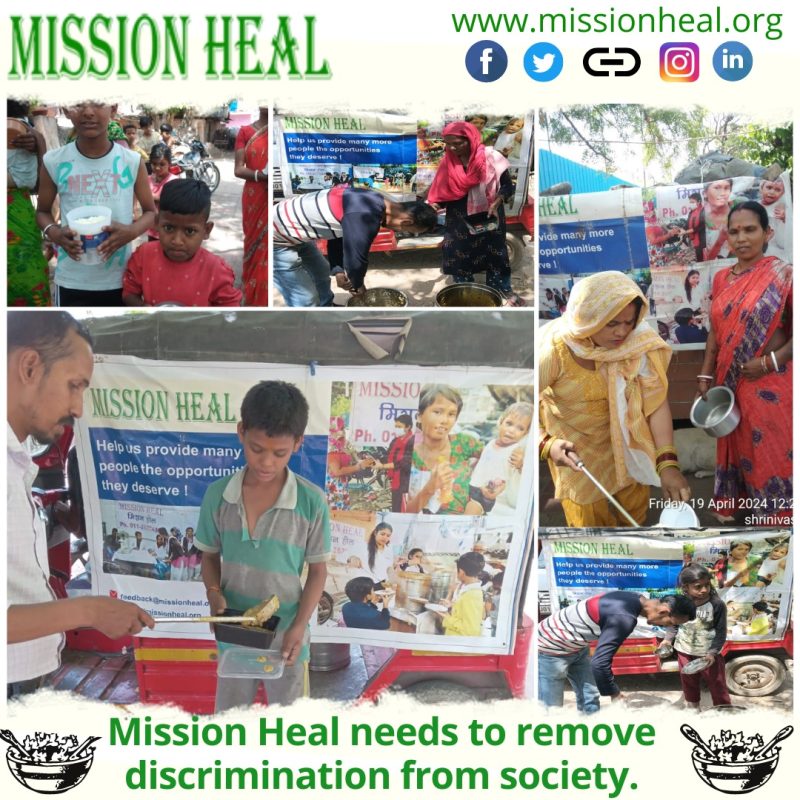Mission Heal is a noble initiative that strives to save lives in a world where many individuals face various issues, including inequality, a lack of resources, and discrimination. Discrimination is an unfortunate reality that no one raises voice against Unfortunately, India is a country where discrimination is widespread. Let us delve deep into what discrimination is and the hardships it imposes on the lives of underprivileged individuals.
Mission Heal is making a positive impact.
Mission Heal is a ray of hope for those who are helpless against society’s judgmental thinking and discrimination. As an NGO, we aim to eliminate these issues through our various programs and steps. Our goal is to create a world where individuals with less faith can live a life full of dignity.
What is discrimination?
Discrimination refers to the unfair or prejudiced treatment of individuals or groups based on certain characteristics, such as their race, gender, age, religion, ethnicity, sexual orientation, or disability. This can result in unequal opportunities, limited access, or differential treatment in areas such as education, employment, housing, and social interaction.
Discrimination violates fundamental human rights and can lead to social injustice, harming both the individual affected and society as a whole.
What bad impacts can discrimination have on society?
Discrimination can have several negative impacts on society. It can create division among different groups and foster a sense of inequality. Discrimination can lead to social unrest, tension, and even violence. It hinders social progress by limiting opportunities for certain individuals or communities based on unfair biases.
Additionally, it perpetuates stereotypes and prejudices, preventing a society from truly embracing diversity and inclusivity. Ultimately, discrimination undermines unity and harmony, hindering the growth and development of a society as a whole.
How does discrimination limit the growth of the less fortunate?
Discrimination denies equal opportunities and resources, hindering the growth of the less fortunate.
- Discrimination denies equal opportunities. Discrimination often hinders access to opportunities for the less fortunate, impeding their growth and development.
- Barriers to education Discrimination hinders access to quality education, which is crucial for personal and societal growth.
- Limited job opportunities Discrimination in the workplace can limit job opportunities and hinder financial growth for marginalized individuals.
- Inadequate healthcare access Discrimination can limit access to healthcare, impacting the well-being and growth of underprivileged individuals.
- Social isolation and a lack of support Discrimination can lead to isolation and a lack of support, making it harder for those who are less fortunate to overcome challenges and achieve growth.
- The cycle of poverty and disadvantage Discrimination creates a cycle of poverty, making it difficult for the less fortunate to break free and achieve prosperity.
- Inequality and social injustice Discrimination limits the potential of less fortunate individuals, perpetuating inequality and social injustice in society.
Discrimination in India
- According to recent reports, approximately 17% of Indians have faced religious discrimination in the past year. Out of these, one in five Muslims (21%), 18% of Sikhs, and 17% of Hindus reported facing discrimination based on their religion.
- Based on a survey conducted in 2020 by the Pew Research Centre in India, 23 percent of the participants believed that women were the demographic group that faced the most discrimination in the country.
- According to the Gender Inequality Index (GII) 2022, India has been ranked 108 out of 193 countries with a score of 0.437. In the previous year’s index, India was ranked 122 out of 191 countries with a score of 0.490.
How can we stop discrimination in India?
To stop discrimination in India, we can take several steps, such as focusing on education, enforcing laws to protect marginalized communities, promoting inclusivity, encouraging diverse media representation, and fostering dialogue among communities. Together, we can create a society free from discrimination.
Mission Heal helps society with the discrimination issue.
Mission Heal is committed to transforming the lives of underprivileged citizens who face discrimination toward an equal society where all individuals have equal rights and resources.
- Mission Heal is an organization that aims to empower women in India. We believe that women face discrimination the most in our society and live a life full of restrictions. To help them overcome these barriers, we offer free skill training and quality education. Our goal is to bridge the gap in gender inequality in society and empower women to lead fulfilling lives.
- The organization provides free, high-quality education and study materials to support underprivileged children in becoming self-sufficient in the future.
- As an organization we aim to take responsibility of basi needs by distributinmg healthy meals. Our aim is to nourish the inner souls of those in need.
- The organization mission of Heal is to provide healthcare facilities and free medicine through health camps in slums and streets.
Conclusion
Discrimination is like a virus that harms the growth and progress of society and its people. As an NGO, we are committed to eradicating this virus from our nation. Our mission is to improve the lives of those in need by providing them with enough resources and opportunities to help them build a better future for themselves and for the country.
You can read such blogs and articles on the website https://missionheal.org/. Follow us on Facebook, Twitter, LinkedIn, and Instagram.

